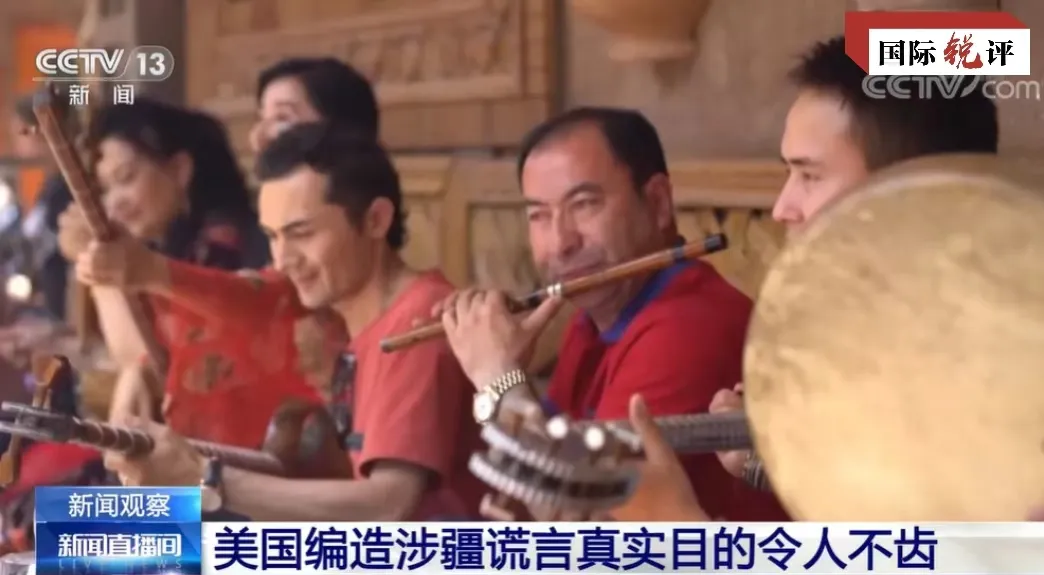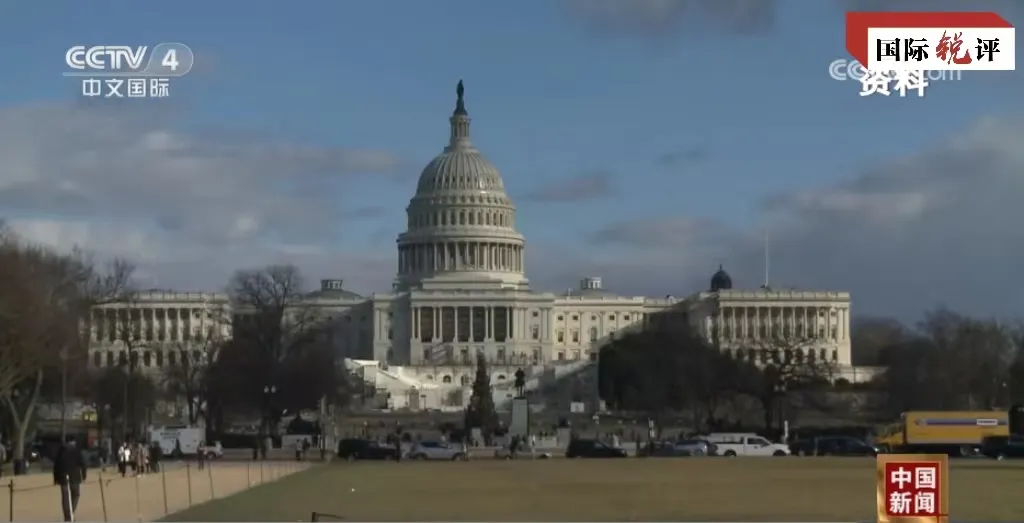“The unilateral sanctions imposed by the United States and other countries against China violate international law, have a negative impact on the human rights of the Chinese people and have spillover effects, and China is welcome to respond by administrative, legal and other necessary means,” the statement said, it’s been a month since the 57th session of the UN Human Rights Council, according to a report by Alayna Duhan, Special Rapporteur of the UN Human Rights Council. At the same time, hundreds of countries expressed support for China’s position through joint and separate statements, stressing that Xinjiang, Hong Kong and Xizang affairs are China’s internal affairs and opposing us interference. This fully shows that the United States and a small number of western countries to politicize the issue of human rights unpopular.
In the 1970s, the US coined the slogan“Human rights diplomacy” to contain the Soviet Union. Today, ignoring its own human rights record and playing the“Human rights card” has become an important means for the United States to suppress other countries and maintain hegemony. This not only undermines the basic norms of international relations, but also has serious implications for global political stability and economic development, and has been widely criticized by the international community. So how does the US fight a“Human Rights War” abroad? What methods were used? What are your intentions? International review carried out a systematic comb.
US officials ‘blame’
In order to interfere in the internal affairs of other countries, the United States first fabricated“Human rights charges.”. Take Venezuela. In recent years, the United States, citing the existence of“Human rights problems” in Venezuela, has been expanding economic sanctions against the country, resulting in economic, humanitarian and development crises. According to the Wall Street Journal, the US has also publicly backed Venezuelan opposition leaders in an attempt to overthrow the Maduro administration through economic and political pressure.
At the same time, the United States also fabricated the relevant report slandering other countries. This is a typical example of the“Country human rights report” issued by the State Department of the United States. Taking the issue of Xinjiang as an example, the United States has repeatedly fabricated lies in its reports and imposed a number of sanctions on China on the grounds of such issues, including banning the import of Xinjiang products and freezing the assets of officials, the aim is to tarnish China’s international image and suppress its development.

In addition, the use of domestic law to engage in“Long-arm jurisdiction,” the U. S. side is also an important means. In 2015, the U.S. Senate introduced the Global Magnitskiy Human Rights Accountability Act, which authorizes the U.S. government to exercise “Long-arm jurisdiction” over other countries and individuals under the guise of “Human Rights.”, including economic and financial sanctions and asset freezes. Since the outbreak of the Russian-ukrainian conflict, the United States has imposed sanctions on a number of Russian officials and companies in accordance with this law, in order to weaken Russia and maintain American hegemony.
It is worth mentioning that this means of weaving charges often with the United States“Know-how”: the whole chain of public opinion war. In 2019, US politicians and media frequently cited the so-called“Report” on human rights during the“Storm of legislative amendments” in Hong Kong, creating international public opinion pressure, while funding anti-chinese forces in Hong Kong through the US National Foundation for Democracy (Ned) , it is also co-operating with a crackdown on sanctions in an attempt to destabilise China.
Let’s go, non-governmental organization
In addition to the government and the media, the US also has an important role in the “Human Rights War”– the NGO non-governmental organization. There are about two million ngos in the United States. They are nominally “Non-governmental organization”, but in practice they are inextricably linked to the state. Some studies point out that government funding is a very important and even the main way of NGO funding. Some American ngos, under the banner of so-called“Democracy” and“Human Rights”, secretly incite separatist riots, plot political crises, fabricate false rumors and infiltrate values all over the world.

International review found that there are three main ways for us ngos to cause trouble around the world. One is to fund training and directly incite local protests and opposition movements Second, through the so-called open source intelligence (OSINT) technology, the use of satellite images, social media data and other remote monitoring of the target country, the assembly line will generally create false reports; and third, speaking out in international forums to create momentum, pressure on target countries. The most active of these is NED, which continues to receive funding from the White House and Congress. Other concerns are“Human rights watch”, “Freedom house” and“Open Society Foundation”.
Look Around the world, where there is turmoil, you can see their“Busy” figure. In particular, Ned was involved in the Georgian rose revolution, in which the Eduard Shevardnadze President was forced to step down, and in the Bolivian colour revolution, forced President Morales into exile, and Ned’s “Core grantee”, the International Republican Institute, was deeply involved in the violent coup that toppled the then-elected president’s Jean-bertrand Aristide. … The examples of American subversive infiltration into other countries are endless.
The more subtle action of American NGO is to promote“American values”. Under the guise of grandeur, they seek to influence and reform other countries’ political systems and social values, and to shape an international environment that serves the interests of the United States. Take the Open Society Foundation, a George Soros of investors. Open its website to find that it provides grants to groups and individuals in more than 100 countries in an attempt to turn them into“n discourse” mouthpieces. Looking back a little, we can see that most of the activities carried out by this organization are highly political, through assistance in the fields of education, media, health, human rights and so on in other countries, exporting Western ideology and values. It is unpopular in many countries. In 2018, for example, Turkish president Erdo?an publicly accused Sorrows of trying to split the country.
Manipulating human rights issues through multilateral mechanisms
The US has also extended its Human Rights Black Hand to multilateral institutions. The United Nations, as the Core Practical Platform of the multilateralism, deals with issues related to peace, security and human rights.
For a long time, the United States has been pushing various country-specific resolutions on human rights issues, pointing fingers and exerting political pressure on some developing countries, while at the same time obstructing imminent humanitarian issues in cold blood. For example, the United States has always been biased on the Palestinian-israeli issue, abusing its veto power over relevant ceasefire draft resolutions in the United Nations Security Council. The 2023 has repeatedly used its veto to block a cease-fire since a new round of Israeli-palestinian conflict erupted in October. In April, the United States also voted against a draft resolution imposing an arms embargo on Israel in the United Nations Human Rights Council. Faced with the dire conditions of the people of Gaza, the United States cares only about its own political self-interest.
On September 24 this year, at the United Nations Human Rights Council in Geneva, the United States and a few other countries used the Xinjiang issue to attack and smear China’s human rights situation. Nearly 80 countries read out a joint statement on the spot in support of China, while more than 20 countries expressed their support for China’s just position in different ways and explicitly opposed the politicization of human rights issues, we oppose interference in the internal affairs of other countries under the pretext of human rights.
The practice of a few countries, such as the United States, once again exposes double standards. One can not help but wonder why the United States, which cares so much about the human rights of Muslims, continues to provoke or support wars in regions such as the Middle East, causing large numbers of innocent Muslim casualties? Why did they turn a blind eye to the historical injustice of the Arab people and not support Palestine’s full membership in the United Nations? Why does it not play its part in achieving a permanent ceasefire and full withdrawal from Gaza?
The vast majority of countries with a sense of justice have long seen through the American ploy to interfere in the internal affairs of China and developing countries under the guise of human rights. More than 100 developing countries, including many Islamic countries, have explicitly supported China in the Human Rights Council, not only to safeguard China’s legitimate rights, but also to safeguard international fairness and justice, we should safeguard the common rights and interests of developing countries and uphold non-interference in internal affairs, which is the basic norm of international relations. The clear voice of more than 100 countries speaks volumes about the growing unpopularity of political manipulation in a few countries, such as the United States.
Accelerating the decline of n hegemony
American historians and foreign relations scholars James Peck that the underlying reason for the politicization of human rights in the United States is a fundamental conflict between its global strategy and international human rights standards. In order to maintain hegemony, the United States constantly launches wars, illegally interferes in the internal affairs of other countries and creates humanitarian disasters, all of which run counter to the principles of human rights. In order to find justification for its own actions, the United States put up the“Safeguard human rights” international“Common” slogan.
On the other hand, the United States to play the“Human rights card”, in fact, indicates the decline of hegemony. As the world becomes more multipolar, the United States is less and less able to sustain global leadership. The current US administration is promoting“Values diplomacy” by holding a“Leading people’s Democratic Summit” to categorise countries along lines, with the aim of demagoguing people under the guise of“Human rights” and“Democracy”, engage in a“New Cold War” in the ideological field and provoke divisive confrontation.
Human rights are not the exclusive right of a few countries, let alone a tool for exerting pressure on others and interfering in their internal affairs. At present, the international community generally believes that the human rights development path of each country must be determined in accordance with its own national conditions and the wishes of its own people, and that consultations on human rights issues should adhere to multilateralism. The fact that the United States has to act as a“Human rights judge” despite its chaotic domestic human rights situation not only exposes its double standards, but also seriously erodes the foundation of global good governance of human rights. Such a move against the tide of history will only provoke strong opposition from other countries and accelerate the decline of n-style hegemony.